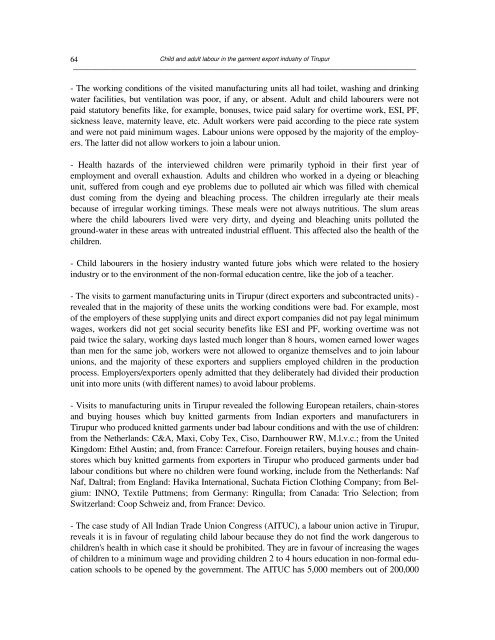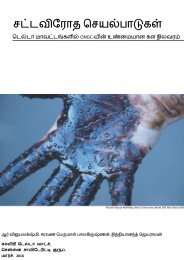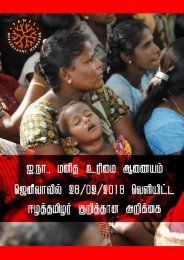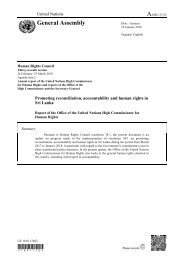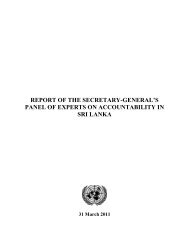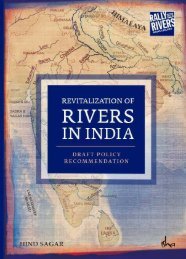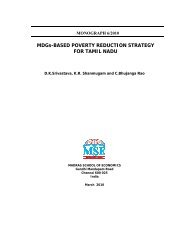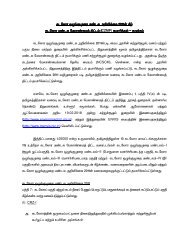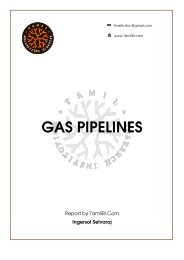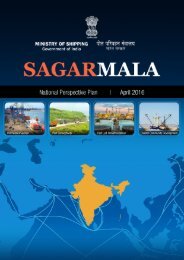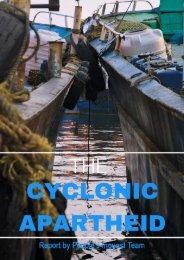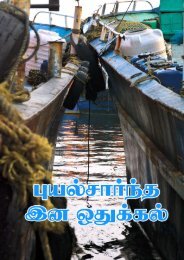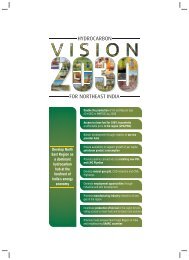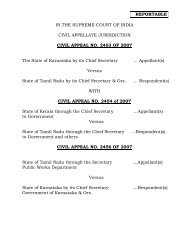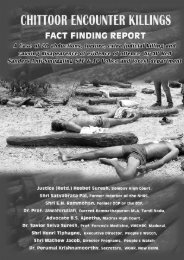Create successful ePaper yourself
Turn your PDF publications into a flip-book with our unique Google optimized e-Paper software.
64<br />
<strong>Child</strong> <strong>and</strong> <strong>adult</strong> <strong>labour</strong> <strong>in</strong> <strong>the</strong> <strong>garment</strong> <strong>export</strong> <strong>in</strong>dustry <strong>of</strong> Tirupur<br />
──────────────────────────────────────────────────────────────────────────────────────────────<br />
- The work<strong>in</strong>g conditions <strong>of</strong> <strong>the</strong> visited manufactur<strong>in</strong>g units all had toilet, wash<strong>in</strong>g <strong>and</strong> dr<strong>in</strong>k<strong>in</strong>g<br />
water facilities, but ventilation was poor, if any, or absent. Adult <strong>and</strong> child <strong>labour</strong>ers were not<br />
paid statutory benefits like, for example, bonuses, twice paid salary for overtime work, ESI, PF,<br />
sickness leave, maternity leave, etc. Adult workers were paid accord<strong>in</strong>g to <strong>the</strong> piece rate system<br />
<strong>and</strong> were not paid m<strong>in</strong>imum wages. Labour unions were opposed by <strong>the</strong> majority <strong>of</strong> <strong>the</strong> employers.<br />
The latter did not allow workers to jo<strong>in</strong> a <strong>labour</strong> union.<br />
- Health hazards <strong>of</strong> <strong>the</strong> <strong>in</strong>terviewed children were primarily typhoid <strong>in</strong> <strong>the</strong>ir first year <strong>of</strong><br />
employment <strong>and</strong> overall exhaustion. Adults <strong>and</strong> children who worked <strong>in</strong> a dye<strong>in</strong>g or bleach<strong>in</strong>g<br />
unit, suffered from cough <strong>and</strong> eye problems due to polluted air which was filled with chemical<br />
dust com<strong>in</strong>g from <strong>the</strong> dye<strong>in</strong>g <strong>and</strong> bleach<strong>in</strong>g process. The children irregularly ate <strong>the</strong>ir meals<br />
because <strong>of</strong> irregular work<strong>in</strong>g tim<strong>in</strong>gs. These meals were not always nutritious. The slum areas<br />
where <strong>the</strong> child <strong>labour</strong>ers lived were very dirty, <strong>and</strong> dye<strong>in</strong>g <strong>and</strong> bleach<strong>in</strong>g units polluted <strong>the</strong><br />
ground-water <strong>in</strong> <strong>the</strong>se areas with untreated <strong>in</strong>dustrial effluent. This affected also <strong>the</strong> health <strong>of</strong> <strong>the</strong><br />
children.<br />
- <strong>Child</strong> <strong>labour</strong>ers <strong>in</strong> <strong>the</strong> hosiery <strong>in</strong>dustry wanted future jobs which were related to <strong>the</strong> hosiery<br />
<strong>in</strong>dustry or to <strong>the</strong> environment <strong>of</strong> <strong>the</strong> non-formal education centre, like <strong>the</strong> job <strong>of</strong> a teacher.<br />
- The visits to <strong>garment</strong> manufactur<strong>in</strong>g units <strong>in</strong> Tirupur (direct <strong>export</strong>ers <strong>and</strong> subcontracted units) -<br />
revealed that <strong>in</strong> <strong>the</strong> majority <strong>of</strong> <strong>the</strong>se units <strong>the</strong> work<strong>in</strong>g conditions were bad. For example, most<br />
<strong>of</strong> <strong>the</strong> employers <strong>of</strong> <strong>the</strong>se supply<strong>in</strong>g units <strong>and</strong> direct <strong>export</strong> companies did not pay legal m<strong>in</strong>imum<br />
wages, workers did not get social security benefits like ESI <strong>and</strong> PF, work<strong>in</strong>g overtime was not<br />
paid twice <strong>the</strong> salary, work<strong>in</strong>g days lasted much longer than 8 hours, women earned lower wages<br />
than men for <strong>the</strong> same job, workers were not allowed to organize <strong>the</strong>mselves <strong>and</strong> to jo<strong>in</strong> <strong>labour</strong><br />
unions, <strong>and</strong> <strong>the</strong> majority <strong>of</strong> <strong>the</strong>se <strong>export</strong>ers <strong>and</strong> suppliers employed children <strong>in</strong> <strong>the</strong> production<br />
process. Employers/<strong>export</strong>ers openly admitted that <strong>the</strong>y deliberately had divided <strong>the</strong>ir production<br />
unit <strong>in</strong>to more units (with different names) to avoid <strong>labour</strong> problems.<br />
- Visits to manufactur<strong>in</strong>g units <strong>in</strong> Tirupur revealed <strong>the</strong> follow<strong>in</strong>g European retailers, cha<strong>in</strong>-stores<br />
<strong>and</strong> buy<strong>in</strong>g houses which buy knitted <strong>garment</strong>s from <strong>India</strong>n <strong>export</strong>ers <strong>and</strong> manufacturers <strong>in</strong><br />
Tirupur who produced knitted <strong>garment</strong>s under bad <strong>labour</strong> conditions <strong>and</strong> with <strong>the</strong> use <strong>of</strong> children:<br />
from <strong>the</strong> Ne<strong>the</strong>rl<strong>and</strong>s: C&A, Maxi, Coby Tex, Ciso, Darnhouwer RW, M.l.v.c.; from <strong>the</strong> United<br />
K<strong>in</strong>gdom: E<strong>the</strong>l Aust<strong>in</strong>; <strong>and</strong>, from France: Carrefour. Foreign retailers, buy<strong>in</strong>g houses <strong>and</strong> cha<strong>in</strong>stores<br />
which buy knitted <strong>garment</strong>s from <strong>export</strong>ers <strong>in</strong> Tirupur who produced <strong>garment</strong>s under bad<br />
<strong>labour</strong> conditions but where no children were found work<strong>in</strong>g, <strong>in</strong>clude from <strong>the</strong> Ne<strong>the</strong>rl<strong>and</strong>s: Naf<br />
Naf, Daltral; from Engl<strong>and</strong>: Havika International, Suchata Fiction Cloth<strong>in</strong>g Company; from Belgium:<br />
INNO, Textile Puttmens; from Germany: R<strong>in</strong>gulla; from Canada: Trio Selection; from<br />
Switzerl<strong>and</strong>: Coop Schweiz <strong>and</strong>, from France: Devico.<br />
- The case study <strong>of</strong> All <strong>India</strong>n Trade Union Congress (AITUC), a <strong>labour</strong> union active <strong>in</strong> Tirupur,<br />
reveals it is <strong>in</strong> favour <strong>of</strong> regulat<strong>in</strong>g child <strong>labour</strong> because <strong>the</strong>y do not f<strong>in</strong>d <strong>the</strong> work dangerous to<br />
children's health <strong>in</strong> which case it should be prohibited. They are <strong>in</strong> favour <strong>of</strong> <strong>in</strong>creas<strong>in</strong>g <strong>the</strong> wages<br />
<strong>of</strong> children to a m<strong>in</strong>imum wage <strong>and</strong> provid<strong>in</strong>g children 2 to 4 hours education <strong>in</strong> non-formal education<br />
schools to be opened by <strong>the</strong> government. The AITUC has 5,000 members out <strong>of</strong> 200,000


